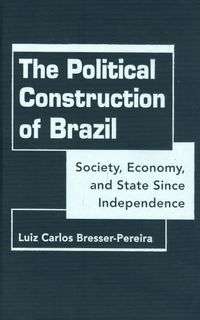Luiz Carlos Bresser-Pereira
Boulder, Co: Lynne Rienner Publishers, 2017

Review by Jose de Arimateia da Cruz
Contents: Introduction
1. Brazil: A History of Long Cycles and Short Political Pacts
2. Colonial Constraints: Why Brazil Was Left Behind
Part 1 The First Cycle: The State and Territorial Integration
3. For Reasons of State: Territorial Integration
4. Herding Oligarchs: Empire, Constitutionalism, and Federalism
5. The First Republic:Prerequisite to Brazil's Capitalist Revolution
Part 2 The Second Cycle: The Nation and Development
6. Igniting Capitalism: The Profitable Revolution of 1930
7. Imperialism and Industrialization: The 1930 National-Popular Pact
8. Crisis, Coup, and Democracy: Resuming Developmentalism After 1945
9. Coffee, Cold War, and Coup (Again): The End of the National-Popular Pact
10. The Crisis of the 1960s:Inflation and the Emergence of Popular Participation
11. The Military in Power: The Authoritarian-Modernizing Pact
12. The Logic of Domination: The Limits of Dependency Theory
13. Neutralizing the Dutch Disease: Exporting Manufactured Goods
14. The Military in Office: Rise and Decline in the 1970s
Part 3: The Third Cycle: Democracy and Social Justice
15. The Democratic-Popular Pact: The Bourgeoisie and the Working Class
16. The Lost Decade: Stagnation and Inertial Inflation in the 1980s
17. The Crisis of 1987: The Collapse of the Democratic-Popular Pact
18. From Elite to Social Democracy: The 1988 Constitution
19. Neoliberal Rule: Privatization and the 1991 Liberal-Dependent Pact
20. Tackling High Inflation: The Real Plan
21. Liberal Rhetoric: The Trap of Overvalued Exchange Rates and High Interest Rates
22. Lula, Dilma, and the Alienation of the Elites
23. The Pact that Never Was
24. The Quasi-Stagnation Since 1981
25. Preference for Immediate Consumption and Loss of the Idea of Nation
Part 4 Conclusion
26. Brazil's Capitalist Revolution, Democracy . . . and Then?



























